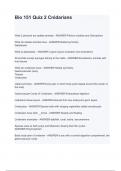Cnidarian - Study guides, Class notes & Summaries
Looking for the best study guides, study notes and summaries about Cnidarian? On this page you'll find 41 study documents about Cnidarian.
All 41 results
Sort by
Bio 151 Quiz 2 Cnidarians questions and answers
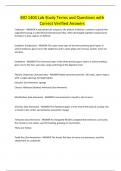
-
BIO 1404 Lab Study Terms and Questions with Correct Verified Answers
- Exam (elaborations) • 22 pages • 2024
-
- $12.94
- + learn more
Cnidocyte - ANSWER A specialized cell unique to the phylum Cnidarian; contains a capsule-like organelle housing a coiled thread (nematocyte) that, when discharged explodes outward and functions in prey capture or defense Ectoderm (Cnidarians) - ANSWER The outer most layer of the three primary germ layers in animal embryos; gives rise to the epidermis and in some phyla, the nervous system, inner ear and lens
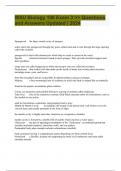
-
WSU Biology 106 Exam 3 >> Questions and Answers Updated | 2024
- Exam (elaborations) • 14 pages • 2024
- Available in package deal
-
- $12.49
- + learn more
WSU Biology 106 Exam 3 >> Questions and Answers Updated | 2024 Spongocoel the large central cavity of sponges. water enters the spongocoel through tiny pores called ostia and it exits through the large opening called the osculum. spongocoel is lined with choanocytes which help to create a current in the water. Spicule structural elements found in most sponges. They provide structural support and deter predators. Large ones are called megascleres while microscopic ones...
![ZOL1501 Exam Revision [2]](/docpics/5918886/66aa7f7316cbd_5918886_121_171.jpeg)
-
ZOL1501 Exam Revision [2]
- Exam (elaborations) • 2 pages • 2024
-
- $12.49
- + learn more
ZOL1501 Exam Revision [2] Choose the correct answer by choosing the number corresponding to the answer you have chosen. 1. Specialized archaeocytes that secrete spongin are called ___________. 1. collencytes 2. sclerocytes 3. choanocytes 4. spongocytes 5. lophocytes 2. Which species of the genus Schistosoma is found in the veins of the large intestine of the human being __________. 1. S. mansoni 2. S. japonicum 3. S. haematobium 4. S. plumula 5. S. hepati...

-
Marine Biology Latest Update Graded A
- Exam (elaborations) • 5 pages • 2023
- Available in package deal
-
- $8.99
- + learn more
Marine Biology Latest Update Graded A Sponge Porifera Jellyfish Cnidarian Sea Anemone Where Nemo lives Coral Polyps Start of a coral reef. Nudibranch A shell-less sea snail. Mussels A mollusc with two shells. Squid A mollusc with eight arms and two long tentacles. Cuttlefish Its internal skeleton is the familiar cuttlebone. Sea Star Echinoderm Sea Urchin A marine echinoderm having a spherical or flattened shell covered in mobile spines. Sea Cucumber an echinoderm which has a th...
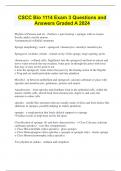
-
CSCC Bio 1114 Exam 3 Questions and Answers Graded A 2024
- Exam (elaborations) • 10 pages • 2024
-
- $14.49
- + learn more
Phylum of Parazoa and etc - Porifera = pore bearing = sponges with no tissues Sessile adults, mostly marine Asymmetrical or Radial symmetry Sponge morphology voacb - spongocel, choanocytes, mesohyl, amoebocytes Spongocel, osculum, ostium - central cavity of the sponge, large opening, pores choanocytes - collared cells; flagellated, line the spongocel and beat in unison and move water towards the top osculum; water goes in through the pores with food that may or may not be good to eat ...
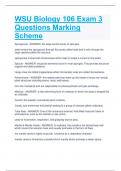
-
WSU Biology 106 Exam 3 Questions Marking Scheme
- Exam (elaborations) • 18 pages • 2023
- Available in package deal
-
- $13.99
- + learn more
WSU Biology 106 Exam 3 Questions Marking Scheme Spongocoel - ANSWER- the large central cavity of sponges. water enters the spongocoel through tiny pores called ostia and it exits through the large opening called the osculum. spongocoel is lined with choanocytes which help to create a current in the water. Spicule - ANSWER- structural elements found in most sponges. They provide structural support and deter predators. Large ones are called megascleres while microscopic ones are calle...

-
Bio Exam 2 Pearson Questions with 100% Correct Solutions
- Exam (elaborations) • 12 pages • 2024
- Available in package deal
-
- $12.49
- + learn more
Bio Exam 2 Pearson Questions with 100% Correct Solutions When sea otters became extremely rare on the California coast, their usual prey (sea urchins) became overabundant and consumed most of the kelp that was the principal habitat for a diversity of fishes and invertebrates. Which statement best describes this situation? - Correct Answer️️ -Sea otters are a keystone species. When goats were introduced into an island off the California coast, they lived in the same areas and ate the s...
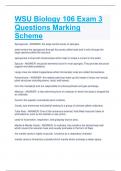
-
WSU Biology 106 Exam 3 Questions Marking Scheme
- Exam (elaborations) • 18 pages • 2023
-
- $13.49
- + learn more
WSU Biology 106 Exam 3 Questions Marking Scheme Spongocoel - ANSWER- the large central cavity of sponges. water enters the spongocoel through tiny pores called ostia and it exits through the large opening called the osculum. spongocoel is lined with choanocytes which help to create a current in the water. Spicule - ANSWER- structural elements found in most sponges. They provide structural support and deter predators. Large ones are called megascleres while microscopic ones are calle...
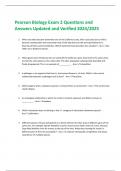
-
Pearson Biology Exam 2 Questions and Answers Updated and Verified 2024/2025
- Exam (elaborations) • 11 pages • 2024
- Available in package deal
-
- $10.49
- + learn more
1. When sea otters became extremely rare on the California coast, their usual prey (sea urchins) became overabundant and consumed most of the kelp that was the principal habitat for a diversity of fishes and invertebrates. Which statement best describes this situation? - AnsSea otters are a keystone species. 2. When goats were introduced into an island off the California coast, they lived in the same areas and ate the same plants as the native deer. The deer population subsequently dwin...

Did you know that on average a seller on Stuvia earns $82 per month selling study resources? Hmm, hint, hint. Discover all about earning on Stuvia

